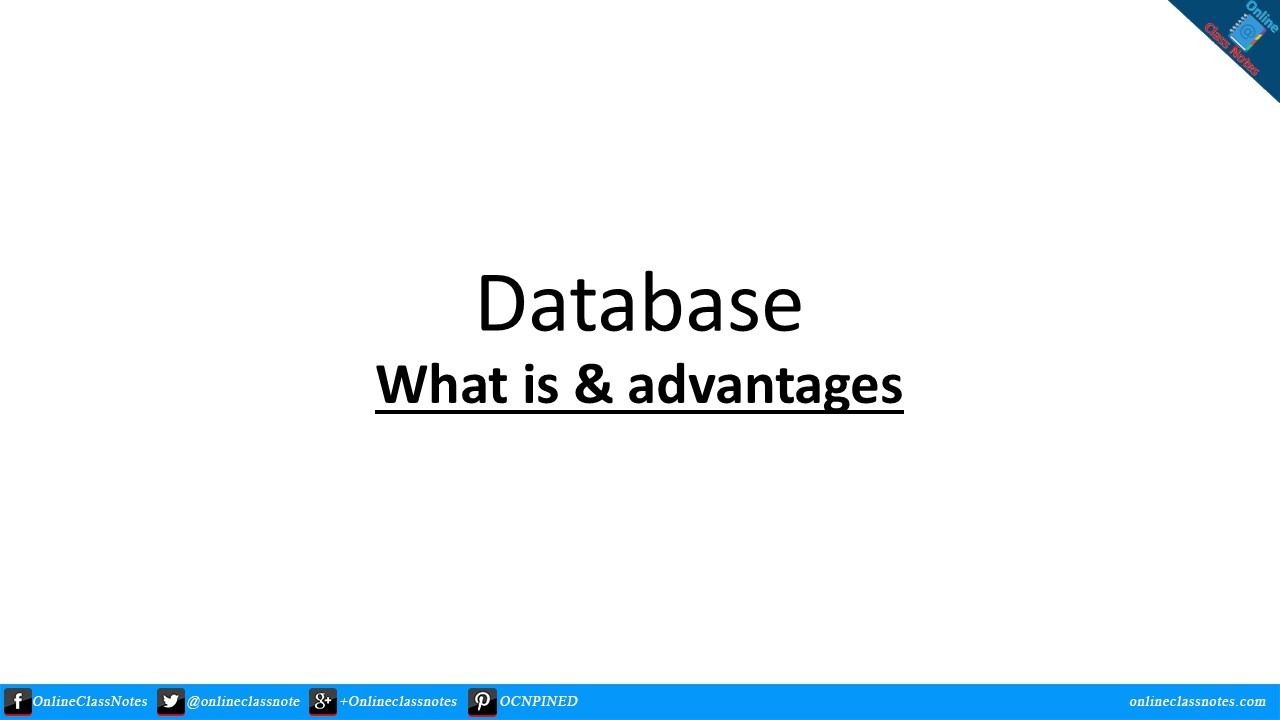Database
The word data means data and the word base means collection. A database is a collection of data. A database is a collection of interrelated data tables or files. In this age of information and communication technology, every organization stores all its data in the database of that organization.
A database can contain multiple tables, forms, reports, queries, macros, etc. The data in the database can be easily used for various purposes. If required, one can modify/update the data, and it can be used efficiently. Although there are many benefits of storing data in databases, database management requires trained skilled human resources.
Use only texts in italic for a short answer
12 Advantages of using database
1. Ensures maximum use of space
Ensures maximum use of space by preventing repetition of the same information.
One of the key advantages of using a database is that it ensures maximum use of space by preventing repetition of the same information. Normalization is used to achieve this, and it involves organizing data in a database in a way that reduces redundancy and dependency.
By doing so, it ensures that each piece of data is only stored once, thereby conserving space and preventing the wastage of resources. This is particularly important when dealing with large amounts of data.
2. Eliminates data asymmetry
Eliminates data asymmetry. Data stored separately may contain outages or data inconsistencies.
By storing data in a centralized database, rather than in multiple locations, it ensures that all data is consistent and up-to-date. When data is stored separately in different locations, there is a risk of inconsistency or outages, which can lead to confusion and errors.
3. Ensures simultaneous multiple accesses to data
Multiple users can work with the same data at the same time.
One of the key advantages of using a database is that multiple users can access and work with the same data at the same time, without the risk of data collisions or conflicts. This is because databases have built-in concurrency control mechanisms that ensure data integrity and consistency.
4. Ensures data security
Ensures data security.
Databases provide robust security features, such as authentication, authorization, and access controls, to ensure that data is only accessed by authorized users. Databases also provide features like encryption, backups, and disaster recovery to ensure that data is secure even in the event of a security breach.
5. Ensures data integrity
Ensuring that information is not deleted after updating before saving.
Databases provide transactional support, which ensures that changes made to the database are either fully committed or fully rolled back, depending on the outcome of the transaction. This ensures that data is not deleted or lost during the update process, which can help to prevent data loss and errors.
6. Ensures independence of information
Creating information independence so that information is not dependent on information management programs and information from one database can be used in other databases and programs.
Databases provide a standardized way to store and manage data, which ensures that data can be easily shared and integrated across different applications and systems. This promotes interoperability and helps to prevent vendor lock-in, which can be a major issue when using proprietary data management solutions.
7. Ensures speedy retrieval of information
Finding information in the shortest possible time.
Databases provide efficient indexing and search capabilities, which enable users to quickly and easily find the information they need. This can help to improve productivity and reduce the time and effort required to perform data analysis and decision-making.
8. Ensures hassle free operations
Create all databases easily and in less time.
Databases provide a variety of tools and frameworks to simplify the process of database creation, maintenance, and management. This can help to reduce the time and effort required to set up and maintain a database, which can be particularly important when dealing with large or complex datasets.
9. Ensures better data visualization and reporting
Data presentation is easy and fast with various visualization and reporting features and format.
Databases provide a variety of reporting and visualization tools to help users analyze and present data in meaningful ways. This can help to improve decision-making and communication, as well as promote collaboration and knowledge sharing across teams.
10. Ensures easy and fast data updates
Stored data can be easily updated at any time.
Databases provide flexible and scalable data models, which enable users to easily modify and update data as needed. This can help to improve data accuracy and relevance, as well as ensure that data is up-to-date and reflective of the current state of the business.
11. Ensures fast data ordering
Data can be arranged and arranged in different orders in less time.
Databases provide a variety of sorting and filtering capabilities, which enable users to arrange and manipulate data in different ways. This can help to improve data analysis and decision-making, as well as promote collaboration and knowledge sharing across teams.
12. Ensures efficient data handling
Data can be handled very efficiently when needed.
Databases are designed to handle large amounts of data efficiently, which enables users to perform complex data analysis and
